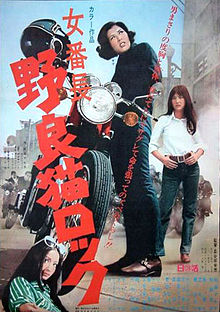- Alleycat Rock: Female Boss
-
Alleycat Rock: Female Boss 
Theatrical poster for Alleycat Rock: Female Boss (1970)Directed by Yasuharu Hasebe[1] Written by Hideichi Nagahara Starring Akiko Wada
Meiko KajiMusic by Kunihiko Suzuki Cinematography Muneo Ueda Editing by Akira Suzuki Distributed by Nikkatsu Release date(s) May 2, 1970 Running time 80 minutes Country Japan Language Japanese Alleycat Rock: Female Boss (女番長野良猫ロック Onna banchō nora-neko rokku) aka Stray Cat Rock: Delinquent Girl Boss, Female Juvenile Delinquent Leader: Alleycat Rock, Wildcat Rock[2] is a 1970 Japanese film directed by Yasuharu Hasebe and starring Akiko Wada and Meiko Kaji. It is the first entry in the five-film Alleycat Rock series.
Contents
Synopsis
A female motorcycle gang is involved in fixing boxing-matches. When their leader is killed by a rival yakuza gang, her second-in-command takes charge and seeks revenge.[3][4]
Cast
- Akiko Wada as Ako[5]
- Meiko Kaji as Mei
- Kōji Wada (和田浩治) as Michio Yagami
- (范文雀) as Yuriko
- Yuka Kemari (久万里由香) as Mari
- Hanako Tokachi (十勝花子) as Hanako
- Yūko Shimazu (島津ゆう子) as Yūko
- Yuka Ōhashi (大橋由香 as Yuka
- Miki Yanagi (柳美樹) as Miki
- Toshimitsu Shima (島敏光 as Maabō
- George Fujita (富田ジョージ) as Hiroshi
- Ken Sanders (ケン・サンダース) as Kelly Fujiyama
- Tatsuya Fuji (藤竜也) as Katsuya
- Yōsui Inoue (as Andre Candre) (アンドレ・カンドレ)
Background
Alleycat Rock: Female Boss was designed by Nikkatsu to compete with Toei's Delinquent Boss series, which, in turn, had been inspired by Roger Corman's early outlaw biker film, The Wild Angels (1966).[6] Nikkatsu also meant the film to showcase the popular singer Akiko Wada, and to appeal to her young audience. Co-star Meiko Kaji, however, attracted the most audience attention, and she became the star of the remaining episodes in the Alleycat Rock series.[7] Nikkatsu regarded Alleycat Rock: Female Boss as a prototype for a new direction for the studio. Its success ensured the studio's move towards youth-oriented action films.[8]
Director Hasebe and cult screenwriter-director Atsushi Yamatoya wrote the script to Alleycat Rock: Female Boss. Because of the film's low budget, the studio gave Hasebe and Yamatoya more creative freedom than was generally the case for Nikkatsu's staff at this time.[9] Of the distinctive look of Alleycat Rock: Female Boss, Hasebe recalled, "I tried to infuse those movies with the culture of the time. I spent a lot of time visiting places where people hung out. At the time, protest songs were popular, so I included them in the soundtrack. I remember, one day I noticed a big fuss near the west entrance of Shinjuku station Activists were gathering and protesting against the US-Japanese Security Treaty. These people were like the hippies in the States. I found them interesting. Cinematic. I wanted my film to be this modern."[7]
Critical appraisal
The Weissers, in their Japanese Cinema Encyclopedia: The Sex Films, judge Alleycat Rock: Female Boss to be better than Toei's Delinquent Boss series, with which it was meant to compete, and call the series, "a prime example of sexually oriented-action movies, five excellent entries over a two year period".[10] The style of the series, according to the Weissers, is "Ultra-chic, yet surprisingly grim".[4] Allmovie writes that Alleycat Rock: Female Boss is "Good-looking and fast-paced".[3]
Availability
Alleycat Rock: Female Boss was released theatrically in Japan on May 2, 1970.[1] It was released on DVD on December 8, 2006.[11]
Bibliography
English
- Alleycat Rock: Female Boss at AllRovi
- Hasebe, Yasuharu. (1998). Interviewed by Thomas and Yuko Mihara Weisser in Tokyo, 1999, in Asian Cult Cinema, #25, 4th Quarter, 1999, p.32-42.
- "NORANEKO ROKKU: ONNA BANCHO". Complete Index to World Film. http://www.citwf.com/film246253.htm. Retrieved 2010-02-22.
- Alleycat Rock: Female Boss at the Internet Movie Database
- Weisser, Thomas; Yuko Mihara Weisser (1998). Japanese Cinema Encyclopedia: The Sex Films. Miami: Vital Books : Asian Cult Cinema Publications. pp. 40–42. ISBN 1-889288-52-7.
Japanese
- "女番長 野良猫ロック(1970)" (in Japanese). www.allcinema.net. http://www.allcinema.net/prog/show_c.php?num_c=143237. Retrieved 2010-02-22.
- "女番長 野良猫ロック" (in Japanese). Japanese Cinema Database (Agency for Cultural Affairs). http://www.japanese-cinema-db.jp/details/11342. Retrieved 2010-02-22.
- "女番長野良猫ロック" (in Japanese). Japanese Movie Database. http://www.jmdb.ne.jp/1970/ct001200.htm. Retrieved 2010-02-22.
- "女番長 野良猫ロック(邦画 )" (in Japanese). Kinema Junpo. http://www.kinejun.jp/cinema/id/19282. Retrieved 2010-02-22.
- "女番長 野良猫ロック" (in Japanese). www.nikkatsu.com. http://www.nikkatsu.com/dig/noranekorock/nr.html. Retrieved 2010-02-22.
Notes
- ^ a b "女番長 野良猫ロック". Japanese Cinema Database (Agency for Cultural Affairs). http://www.japanese-cinema-db.jp/details/11342. Retrieved 2010-02-22.
- ^ "NORANEKO ROKKU: ONNA BANCHO". Complete Index to World Film. http://www.citwf.com/film246253.htm. Retrieved 2010-02-22.
- ^ a b Firsching, Robert. "Female Juvenile Delinquent Leader: Alleycat Rock: Plot Synopsis". Allmovie. http://www.allmovie.com/work/female-juvenile-delinquent-leader-stray-cat-rock-161591. Retrieved 2010-02-22.
- ^ a b Weisser, Thomas; Yuko Mihara Weisser (1998). Japanese Cinema Encyclopedia: The Sex Films. Miami: Vital Books : Asian Cult Cinema Publications. p. 41. ISBN 1-889288-52-7.
- ^ "女番長 野良猫ロック(邦画 )" (in Japanese). Kinema Junpo. http://www.kinejun.jp/cinema/id/19282. Retrieved 2010-02-22.
- ^ Weisser, p. 40
- ^ a b Hasebe, Yasuharu. (1998). Interviewed by Thomas and Yuko Mihara Weisser in Tokyo, 1999, in Asian Cult Cinema, #25, 4th Quarter, 1999, p.34.
- ^ Weisser, Thomas. Introduction to Hasebe, Yasuharu. (1998). Interviewed by Thomas and Yuko Mihara Weisser in Tokyo, 1999, in Asian Cult Cinema, #25, 4th Quarter, 1999, p.32-42.
- ^ Hasebe, pp. 35-36.
- ^ "Weisser, pp. 40-41.
- ^ "女囚101 しゃぶる (VHS)" (in Japanese). Amazon.com. http://www.amazon.co.jp/gp/product/B000ICLNUG/. Retrieved 2010-02-23.
Films directed by Yasuharu Hasebe Black Tight Killers (1966) · Slaughter Gun (1967) · Retaliation (1968) · Alleycat Rock: Female Boss (1970) · Stray Cat Rock: Sex Hunter (1970) · Naked Seven (1972) · Female Convict Scorpion: Grudge Song (1973) · Assault! Jack the Ripper (1976) · Rape! 13th Hour (1976) · Attacked!! (1978)
Categories:- Japanese films
- Japanese-language films
- 1970 films
- Films directed by Yasuharu Hasebe
- Nikkatsu films
- Japanese film stubs
Wikimedia Foundation. 2010.
